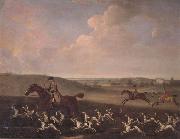Wholesale Oil Painting No Minimum |
|||||||||||
|
|
|||||||||||

|
|||||||||||
|
|
|
||||||||
James SeymourBritish Painter , ca.1702-1752 English painter and draughtsman. The son of James Seymour (d 1739), a dealer in pictures and precious metals, Seymour was among the first English painters to specialize exclusively in sporting subject-matter. Though he possibly received some informal drawing instruction from the topographer Francis Place, Seymour was essentially a self-taught artist whose education was based on the study of pictures that passed through his father's hands; one of his earliest known works is a sketch of a horse's head after van Dyck (sold London, Christie's, 16 June 1970). His early 'genius to drawing of horses' was, according to George Vertue, compromised by 'modish extravagances' through living 'gay high and loosely' and because he 'never studied enough to paint or colour well'. Elsewhere, however, it was recorded that by 1739 he was 'reckoned the finest draughtsman in his way [of horses, hounds etc.] in the whole world' (Universal Spectator, 1739), and he was certainly preferred to his chief rival, John Wootton, by many sporting patrons. Among his employers was William Jolliffe MP, of Ammerdown. Though many of his paintings are either derivative of Wootton or simply inept, or both, others are characterized by a self-conscious stylistic naivety in which meticulous attention to detail and eerily static compositions combine to create curiously memorable images of some apparent sophistication. |
||||||||
|
|
||||||||
A Huntsman and Hounds Near a Country House
A Huntsman and Hounds Near a Country House Painting ID:: 27453 |
oil on canvas 37 by 48 1/4 in 94 by 122.6 cm (mk59) oil on canvas 37 by 48 1/4 in 94 by 122.6 cm (mk59) |
|||||||
|
CONTACT US |

